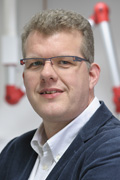Title: Towards non noble metal based catalysts for biobased conversions – role of TIPTOP chemistry
Speaker:Prof. Dr. Harry Bitter
Wageningen University, Wageningen, The Netherlands
Time: 10:00am- 11:30am, (Tues.) 13, January 2015
Venue: Room 468, Lee Hsun Building
Welcome to attend!
Abstract:
Catalysis is and will be in the heart of efficient chemical transformations. With the quest towards a more sustainable use of the resources of our planet new challenges for the catalysis society arise. The most promising renewable source for chemicals and materials is biomass. However catalytic conversion of biomass is challenging in many respects. The feed composition is variable and depends on the source of biomass but also on seasonal and growing conditions.
The conditions relevant for biomass conversion (pH, water), dilute solutions, presence of ‘impurities’ are demanding for heterogeneous catalysts. In addition noble metals are scarce.
In this presentation I will show what the research lines of my group in Wageningen are and what the leads are for addressing some of the above mentioned challenges. I will discuss a few cases i.e.,:
- deoxygenation of lipid based feedstocks using Pd, W2C and Mo2C on carbon nanofibers
- stability of heterogeneous catalysts under aqueous conditions, especially Ni on carbon nanofibers.
These examples were chosen to demonstrate part of the concept of what I call TIPTOP chemistry i.e. Turning variable InPut to Tailored OutPut.
 Harry Bitter is full Professor of the chair group Biobased Chemistry and Technology at the Wageningen University. His group focuses on the sustainable production of bulk chemicals and fuels from biomass by an integrated approach. The motto of the group is TIPTOP chemistry and technology: Turning variable InPut into Tailored OutPut, which is one of the great challenges in biomass conversion.
Harry Bitter is full Professor of the chair group Biobased Chemistry and Technology at the Wageningen University. His group focuses on the sustainable production of bulk chemicals and fuels from biomass by an integrated approach. The motto of the group is TIPTOP chemistry and technology: Turning variable InPut into Tailored OutPut, which is one of the great challenges in biomass conversion.
He studied chemistry at the Catholic University of Nijmegen (Radboud University), specializing in organic and organometallic chemistry. Subsequently, he performed his PhD research at the University of Twente in the group of Prof. Johannes Lercher. Focussing on the development and understanding of bifunctional Pt/ZrO2 catalysts for CO2/CH4 reforming to syngas. In 1997, he received his Doctorate degree. As a junior staff member he continued working in the field of heterogeneous catalysis at Utrecht University, focusing on the use of X-ray spectroscopy in catalysis. Since 1999, he was a scientific staff member at Utrecht University in the group of Inorganic Chemistry and Catalysis. During the last years he has focused on the application of catalysis in biomass-based conversions and the use of carbon-based catalysts.



